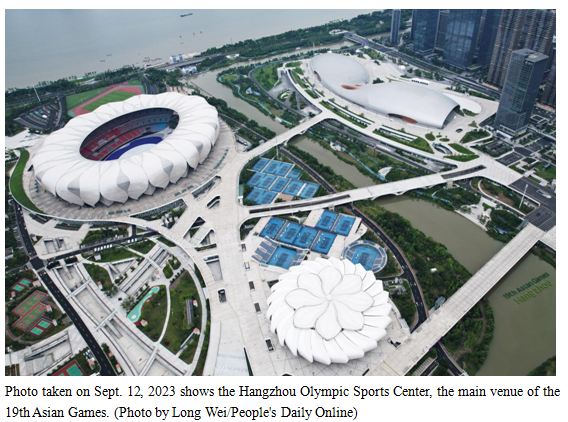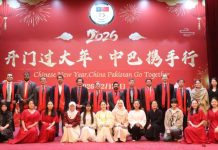By Li Zhongwen, Zheng Yi, People’s Daily
The 19th Asian Games opened in Hangzhou, east China’s Zhejiang province on Sept. 23. Hangzhou, together with five co-host cities, namely Ningbo, Wenzhou, Huzhou, Shaoxing, and Jinhua, have always adhered to the concept of hosting a “green, intelligent, frugal and civilized” Asian Games.
Aiming to make the event streamlined, safe and splendid, they are striving to present a wonderful Asian Games with Chinese characteristics and Asian styles.
The Hangzhou Asian Games has by far the largest scope, biggest number of events, and most extensive coverage in history. With 40 sports and 61 disciplines, over 12,000 athletes from 45 countries and regions will compete for a total of 481 gold medals.
From formulating the plans for torch relay and the opening and closing ceremonies, to continuously improving the urban transportation system and comprehensively lifting urban image, Hangzhou has meticulously prepared for the Asian Games in every aspect.
With world-class venues and facilities, smooth event organization, and thoughtful services, Hangzhou is committed to providing Asian athletes with a stage to showcase their talent.
“Hangzhou is fully prepared. This Asian Games will allow the world to see the beauty of Hangzhou, the vitality of Zhejiang, and the splendor of China,” said Chen Weiqiang, executive secretary general of the Hangzhou Asian Games Organizing Committee.
Greenness is the distinct feature of the Hangzhou Asian Games. From venue planning and construction to energy coordination and utilization, and from transportation support to event organization and operation, greenness is highlighted throughout the Games.
Hangzhou has rolled out a Zero-waste Asian Games Improvement Action Plan, setting up 16 “zero-waste Asian Games cell” demonstration sites and striving to make the Hangzhou Asian Games the world’s first large-scale zero-waste sporting event.
Wind and solar power from thousands of miles away is transmitted to Hangzhou and the co-host cities, lighting up 56 competition venues.
The concept of green development is integrated into every aspect of the preparation for the Games, showing the world China’s innovation and actions in creating a green future.
The Hangzhou Asian Games is the first smart Asian Games in history, with numerous technological achievements and cutting-edge technologies widely applied throughout the preparations.
At this Asian Games, venue support, event operations, cloud services and other aspects all strongly demonstrate the power of intelligent technology.
Relying on cloud computing, the Asian Games core system provides a powerful data processing platform for athletes, staff, spectators and more.
Spectators can fully enjoy the Games through a digital platform offering one-stop services. They can also visit scenic spots and museums, and take public transport with the digital package “Asian Games Pass.” Besides, a digital torchbearer program has been launched, allowing everyone to participate in the Asian Games.
With an aim to host a frugal Asian Games, the organizers focused on renovating existing venues rather than building new ones. Out of the 56 competition venues, 44 are renovated or temporary structures, and all 31 training venues remodeled.
The approach for event-related facilities and equipment is to prioritize borrowing over renting, and renting over buying, with a strong emphasis on recycling and reusing whenever possible.
To reduce waste, staff members are encouraged to bring their own water bottles and meals are kept simple to minimize food waste. Paper waste is also reduced wherever possible. Additionally, franchised stores provide eco-friendly mascots and packaging is minimized.
Simple yet sophisticated. More resources are invested into optimizing services. The innovative approach of reducing unnecessary elements greatly contributes to the success of the event.
Hangzhou has launched a campaign to strengthen urban quality, governance and civility in preparation for the Asian Games, holding over ten thousand related events and activities.
Ningbo has implemented and promoted various initiatives to improve urban civility in a coordinated manner, resulting in a noticeable transformation of the city’s urban, rural, and Asian Games environments.
The renovation of Shaoxing Olympic Sports Center Gymnasium focused on the wellbeing of people, enabling people with disabilities to easily access seats with assistive devices.
Taking concrete actions to host a “green, intelligent, frugal and civilized” Asian Games, Hangzhou is doing its best to welcome guests from across Asia and the world.
At the 42nd General Assembly of the Olympic Council of Asia, newly elected President Sheikh Talal Fahad Al-Sabah said that he believes Hangzhou is fully ready to host an exceptional Asian Games.
The Asian Games provides another opportunity for the world to experience and understand China. China’s preparation for the Games not only represents the fulfillment of its promises and efforts to promote development, but also showcases the country’s historic achievements in the new era.
As the third Asian Games hosted in China, the Hangzhou Asian Games has been vibrant since the beginning of its preparation. The event is showing prospects, openness and hopes through the smiles of the 37,600 volunteers for the Games and the 1.48 million city volunteers.

















